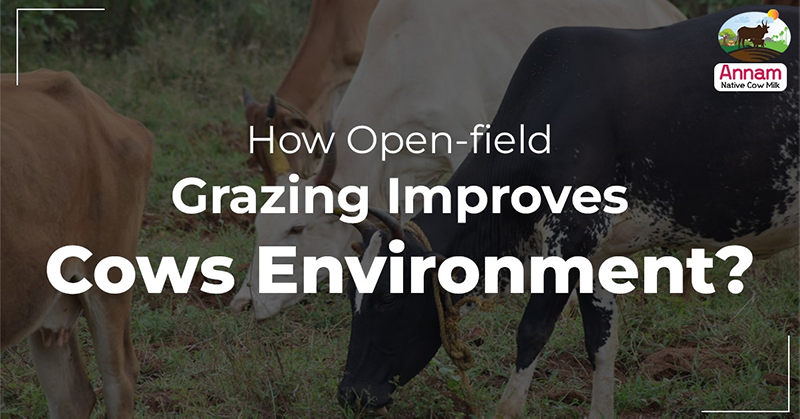Free grazing practices, or rotational or managed grazing, can significantly improve ecosystems when implemented thoughtfully and sustainably. The rotational or managed grazing practices involve allowing cows to graze on a piece of land for a limited period before moving them to another area. However, at Annam organic farms in Chennai, our cows are left to graze within our farm vicinity throughout the day. Hence, these free grazing practices offer several ecological benefits contributing to overall ecosystem health. This blog will explore how free-grazing practices improve ecosystems.
Biodiversity Enhancement:
One of the key advantages of free grazing is its potential to enhance biodiversity. When cows graze in open farmland, they help maintain a diverse range of plant species. Cows have selective grazing habits where they consume some plants while leaving others untouched. This selective grazing can prevent dominant plant species from taking over, allowing a more diverse plant life to thrive. Hence, this benefits other species that rely on different plants for food and shelter.
Soil Health:
Free grazing practices can also improve soil health. Continuous grazing can lead to soil compaction, erosion, and nutrient depletion. In contrast, rotational grazing promotes healthier soils by reducing compaction and promoting the natural decomposition of organic matter. As cows graze and trample the vegetation in one area, they contribute to the breakdown of plant material, which enriches the soil with organic matter. It improves water retention, nutrient cycling, and soil fertility. Healthier soils are essential for the growth of plants, which in turn support various animal species.
Reduced Fire Risk:
In some areas, such as grasslands, free grazing helps reduce wildfires as the cows feed on flammable grasses due to the accumulation of dry and combustible material. This grazing can act as a natural firebreak, limiting the spread of wildfires and protecting natural habitats and human communities.
Habitat Restoration:
In some cases, free grazing can be used as a tool for habitat restoration. In ecosystems where invasive plants threaten native vegetation, well-managed grazing by cows can help control the spread of these invasives. Cows can be strategically introduced to graze on invasive plants, reducing their dominance and allowing native species to recover. This approach can aid in the restoration of natural habitats and the conservation of native flora and fauna.
Free grazing practices offer numerous benefits that improve ecosystems. They enhance biodiversity, promote soil health, reduce fire risk, and help restore habitat. However, it's essential to emphasize that the success of these practices depends on proper management and sustainable approaches. Effective free-grazing systems require careful planning and monitoring to ensure they do not degrade the land or harm animal welfare. At Annam Farms, the best provider of organic milk in Chennai, we follow free grazing practices that can enhance ecosystem health and resilience when implemented with care and consideration for the environment and farmers' livelihoods.




